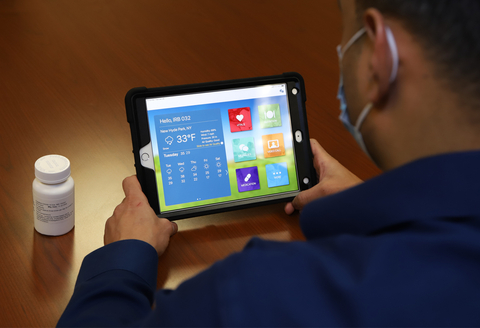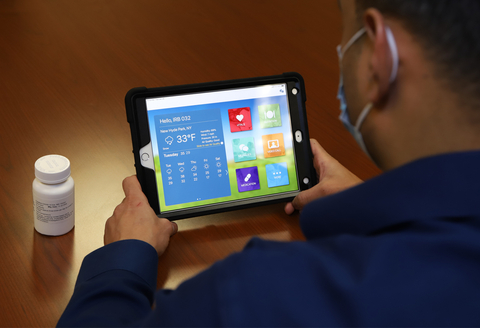MANHASSET, N.Y.--(BUSINESS WIRE)--A high dose of famotidine, commonly known as Pepcid, was found to have beneficial effects in adult patients with coronavirus disease 2019 (COVID-19), according to results of an outpatient clinical trial. Patients who took famotidine in this trial experienced a decrease of inflammation within the body and reported earlier alleviation of symptoms. Findings from the trial, led by The Feinstein Institutes for Medical Research at Northwell Health and Cold Spring Harbor Laboratory (CSHL) were published today in the journal Gut.
Famotidine is a safe, low-cost, over-the-counter drug usually used to treat heartburn. People with COVID-19 often get sick because the body’s inflammatory response to the virus gets overactivated. Previous studies have shown famotidine turns inflammation down by blocking a specific molecular pathway. This trial confirms that famotidine leads to earlier resolution of inflammation in patients with COVID-19 and also alleviates symptoms of the disease while the acquisition of immunity against the virus that causes COVID-19 is maintained. Because famotidine does not target the virus directly like vaccines or antiviral medications, it may be a promising potential treatment for patients with COVID-19 and emergent viral variants.
“We found that famotidine is safe at the higher doses used and see molecular and clinical evidence that it improves the recovery of symptomatic patients of diverse ancestries diagnosed with COVID-19,” said Tobias Janowitz, MD, PhD, principal investigator of the trial, assistant professor at CSHL and adjunct professor at the Feinstein Institutes. “We closely monitored patients in this fully remote clinical trial while protecting their safety and that of health care providers in pandemic conditions. We hope that the data we are sharing with this study guide future trials that are necessary to confirm famotidine as a treatment for patients with COVID-19.”
The trial, which was launched in January 2021, was an entirely remote, randomized, double-blind, placebo-controlled clinical trial to evaluate the safety and efficacy of famotidine in diverse patient populations. It was designed to keep trial participants out of the hospital throughout their treatment by enabling participation from home. Additionally, in collaboration with New York City Health + Hospitals, eligible patients residing in COVID-19 quarantine hotels were approached to participate, which helped diversify enrollment.
“Our institutions worked extremely well together to face challenges the pandemic posed, like offering digital solutions and reaching populations who struggled for access to care,” said Christina Brennan, MD, vice president of clinical research at the Feinstein Institutes and co-investigator of the trial. “From screening patients to organizing home delivery of the equipment and medication, this sets a new model for future trials and convenience for participants.”
Adult COVID-19 positive patients with mild to moderate symptoms were sent a cellular-activated Apple iPad, along with a Bluetooth-enabled scale, thermometer, fitness tracker, spirometer (to study air flow in and out of the lungs), and pulse oximeter (to measure blood oxygen levels). Nearly two-thirds of patients enrolled were from Black, mixed-race, or Hispanic communities.
“Accessible, safe, and low-cost outpatient treatment options are a priority in our global efforts to combat COVID-19. Northwell Health and New York City Health + Hospitals provided care for the communities most in need of support in NYC,” said Nicole Jordan-Martin, the executive director for NYC Health + Hospitals/Community Care, which operates the NYC Test & Trace Corps Take Care Hotel Program whose team helped connect guests to the clinical trial coordinators at the Feinstein Institutes. “Many of our nursing staff and guests at Take Care hotel sites made an important contribution to the trial.”
Either placebo or famotidine at 80 mg three times per day was taken orally for a maximum of 14 days by 55 non-vaccinated participants – 28 received placebo and 27 received famotidine. Northwell’s Home Lab program was used for required blood draws and COVID-19 diagnostic nasal swabs tests. Participants who took famotidine experienced quicker resolution of inflammation in the body, according to blood work results, and the patients tolerated the higher dosage of medication very well. In addition, patients who took famotidine experienced more rapid resolution of symptoms and better resolution of 14 out of 16 assessed symptoms, including improvement in breathing, chest congestion, cough and abdominal pain. The prespecified primary endpoint, an earlier resolution of the sum of all symptom scores, was not reached at statistical significance.
“In today’s virtual world, our clinical trial strategy has significant implications for how to study new drugs in patients at home,” said Kevin J. Tracey, MD, president and CEO of the Feinstein Institutes and member of the study team. “Because SARS-CoV2 continues to infect millions, the data from this trial of an effective, safe, cheap, generic drug should be valuable to global efforts to find safe and affordable therapies to treat COVID-19.”
The trial was supported by statisticians from Stony Brook University and funded in part by the Pershing Square Foundation and by a FastGrant from Emergent Ventures.
About Cold Spring Harbor Laboratory
Founded in 1890, Cold Spring Harbor Laboratory has shaped contemporary biomedical research and education with programs in cancer, neuroscience, plant biology and quantitative biology. Home to eight Nobel Prize winners, the private, not-for-profit Laboratory employs 1,100 people including 600 scientists, students and technicians. The Meetings & Courses Program annually hosts more than 12,000 scientists. The Laboratory’s education arm also includes an academic publishing house, a graduate school and the DNA Learning Center with programs for middle, high school and undergraduate students and teachers. CSHL has been a National Cancer Institute designated cancer center since 1987. For more information, visit www.cshl.edu.
About the Feinstein Institutes
The Feinstein Institutes for Medical Research is the home of the research institutes of Northwell Health, the largest health care provider and private employer in New York State. Encompassing 50 research labs, 3,000 clinical research studies and 5,000 researchers and staff, the Feinstein Institutes raises the standard of medical innovation through its five institutes of behavioral science, bioelectronic medicine, cancer, health system science, and molecular medicine. We make breakthroughs in genetics, oncology, brain research, mental health, autoimmunity, and are the global scientific leader in bioelectronic medicine – a new field of science that has the potential to revolutionize medicine. For more information about how we produce knowledge to cure disease, visit http://feinstein.northwell.edu and follow us on LinkedIn.






